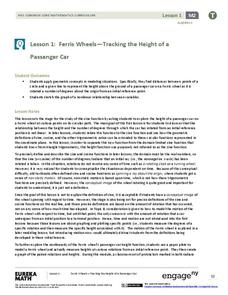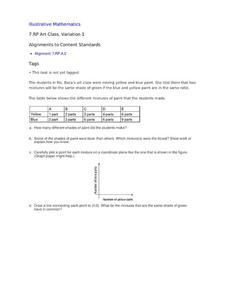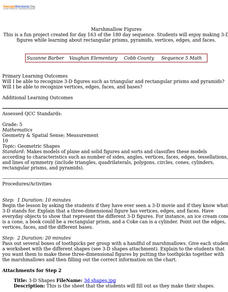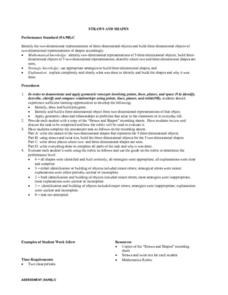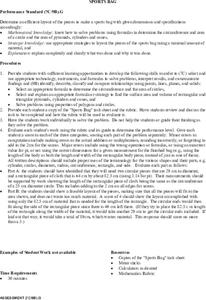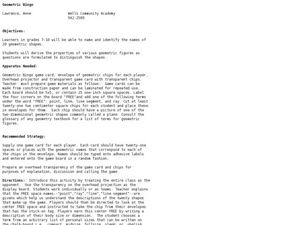Curated OER
Graphing Systems of Inequalities
Solve equations and graph systems of inequalities. Designed as a instructional activity to reinforce these concepts, learners revisit shading and boundaries along with solving linear inequalities.
Virginia Department of Education
Graphing Linear Equations
Combine linear equations and a little creativity to produce a work of art. Math scholars create a design as they graph a list of linear equations. Their project results in a stained glass window pattern that they color.
Curriculum Corner
8th Grade Math Common Core Checklist
Ensure your eighth graders get the most out of their math education with this series of Common Core checklists. Rewriting each standard as an "I can" statement, this resource helps teachers keep a record of when each standard was taught,...
EngageNY
Definition of Rotation and Basic Properties
Examine the process of rotating images to visualize effects of changes to them. The fifth lesson of 18 prompts pupils to rotate different images to various degrees of rotation. It pays special attention to rotations in multiples of 90...
Charleston School District
Review Unit 4: Linear Functions
It's time to show what they know! An assessment review concludes a five-part series about linear functions. It covers all concepts featured throughout the unit, including linear equations, graphs, tables, and problem solving.
EngageNY
Ferris Wheels—Tracking the Height of a Passenger Car
Watch your pupils go round and round as they explore periodic behavior. Learners graph the height of a Ferris wheel over time. They repeat the process with Ferris wheels of different diameters.
Curated OER
Art Class, Variation 1
Student statisticians calculate ratios to determine how many shades of green were mixed by Ms. Baca's art class. They graph the number of blue parts against the number of yellow parts for each combination and discover that some produce...
EngageNY
Secant and the Co-Functions
Turn your class upside down as they explore the reciprocal functions. Scholars use the unit circle to develop the definition of the secant and cosecant functions. They analyze the domain, range, and end behavior of each function.
Curated OER
Marshmallow Figures
Students enjoy making 3-D figures while learning about rectangular prisms, pyramids, vertices, edges, and faces. After a lecture/demo, students use marshmallows, toothpicks and a worksheet imbedded in this lesson to create 3 dimensional...
Curated OER
Inquiry Unit: Modeling Maximums and Minimums
Young mathematicians explore the maximun area for patio with the added complexity of finding the mimimum cost for construction. First, they maximize the area of a yard given a limited amount of fence and plot width v. area on a scatter...
Teach Engineering
Can You Resist This?
Some things are hard to resist. Small collaborative groups build circuits and calculate the voltage using Ohm's Law. Budding engineers explore the connection between the voltage across different resistors and linear functions with...
Charleston School District
Sketching a Piecewise Function
How do you combine linear and nonlinear functions? You piece them together! The lesson begins by analyzing given linear piecewise functions and then introduces nonlinear parts. Then the process is reversed to create graphs from given...
EngageNY
A Surprising Boost from Geometry
Working with imaginary numbers — this is where it gets complex! After exploring the graph of complex numbers, learners simplify them using addition, subtraction, and multiplication.
Curated OER
Straws and Shapes
Students investigate the concepts related to observing two dimensional objects. They also build three dimensional objects using the two dimensional objects. The students give an oral or written explanation for how the pieces fit together...
Curated OER
Sort It Out and Match It Up
Students identify objects that are the same shape and size. They compare and contrast attributes of two-and three-dimensional objects using appropriate vocabulary. Pupils justify an extension of a geometric pattern to explain what was...
Curated OER
Math: Equal Area Triangles
Students examine a math worksheet and determine how to divide a single triangle into four of equal area. Using geometric principles, they sketch two additional ways to divide into into four equal triangles. To conclude, students...
Curated OER
Sculpture Shapes
Young scholars reconstruct an ancient Greek sculpture using various geometric forms and explore different geometric forms. They create an abstract human form out of geometric shapes and create other representations out of the same shapes.
Curated OER
Sports Bag
Young scholars determine an efficient layout of the pattern pieces needed to make a sports bag with given dimensions and specifications. Given a word problem, data set and a diagram, students evaluate the information they have available...
Curated OER
2-D Geometry
Third graders describe and compare attributes of two-dimensional shapes. They explain geometric terms, angles and shapes. Students demonstrate each vocabulary word with their body and they mirror the body positions associated with each...
Curated OER
Measure Up!
Students examine parallax and angular measurements. In this investigative instructional activity students calculate distances of objects and map their results.
Curated OER
Geometric Bingo
Students explore the concept of geometric shapes. In this geometric shape lesson, students play bingo to review geometric shapes. Students identify the shape being described by the teacher and put a marker on their bingo card.
Curated OER
Classifying and Constructing Corners
Fifth graders, after seeing Honeycomb examples, complete a Classifying Angles worksheet, Clock worksheet, and Defining Angles worksheet.
Curated OER
Shapes Around Us
Students create posters about geometric shapes in order to demonstrate their understanding of the different shapes. Students look for pictures in magazines to represent two-dimensional shapes, paste them on a poster, label the shape,...







